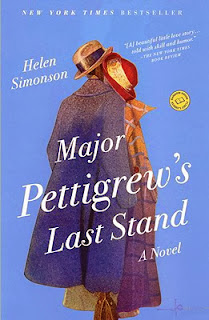Major Pettigrew's Last Stand
 Major Pettigrew's Last Stand, by Helen Simonson
Major Pettigrew's Last Stand, by Helen SimonsonMy mom gave this to me a while ago, I think. It was very popular for a while a year or two ago but I haven't seen it mentioned lately. As usual, I am far behind the times and only now catching up.
Major Pettigrew is the last of a dying breed--the old-fashioned English army man. As a child, he lived in Lahore before Partition. He is a great believer in duty, honor, and restraint, and his love for his small corner of the English countryside is unbounded (but quiet). But now...his brother has died unexpectedly, his son is distressingly shallow and distant, and even his village is threatened with development. Major Pettigrew's growing friendship with Mrs. Ali, the widow who runs the corner shop, is the focus and comfort of his life, but absolutely no one approves.
It's nice to see a novel that features a romance between older people (as happens in real life all the time, not so much in books). Mrs. Ali is my favorite person in the book. Major Pettigrew is interesting because he starts the story feeling completely justified in all of his opinions, but has to uncover flaws in himself that he didn't realize were there and learn empathy for other flawed people too. The reader goes on this journey with him, so you don't see him all at once.
On the whole, a pretty good read. Very English-countryside, but not cozy--more new-reality.
It did have some moments that set off one--well, two related ones--of my pet irritations. First, naturally they all despise tourists and trippers as a matter of course. Everyone knows that trippers are the bane of all the nice unspoiled corners of the world, right? Here you want to enjoy the forest or the beach and it's full of other people who want to enjoy it too, how irritating. And they have children, who are noisy. Heaven forbid that people should want to visit places and enjoy some nature, maybe even have their children learn about nature so they can grow up and be marine biologists. If no one visits and appreciates places like that, they won't care about preserving them, will they? I really kind of resent it when people talk about tourists as if they were a curse upon the land. I like to travel. I want to see other places. That pretty much makes me a (wishful at this time) tourist. Why should anyone despise me because I want to see and appreciate other places? Of course, only other people count as tourists--people who don't like tourists are some other sort of traveler.
Second, the development awfulness. I do quite understand that people living in a lovely little village do not necessarily want tract homes and apartments going up and the place expanding. I myself am not thrilled to see almond orchards cut down in favor of apartment buildings (and I do think that pretty backwards; we have some of the best soil in the world, so we build apartments on it, while the near-barren land a few miles south is empty. I should think we would want to use the good soil to grow food on and the other to build on.). However. People do have to live somewhere. If no houses are allowed to be built anywhere, where are they supposed to live? An awful lot of the time this phenomenon seems to cover up a tremendous dislike of, and snobbery about, people who are not as well-off as the people already there, or who are more well-off, or in fact just people who don't already belong to the tribe. (Major Pettigrew actually puts kind of a hilarious spin on the development issue, so don't take this as disliking the book--it just brings it up for me.)




I read this book a while ago and enjoyed it pretty much, but one thing that stood at to me was how he was this older man and his only son's wife just lets slip she had an abortion and he never even registers it. That was it, his only grandchild, gone like that and he doesn't care. It just struck me as so post-Christian, me-generation-ish. In the end everything is about the self and romance and never about anything broader than that. It kind of ruined the whole book for me.
ReplyDeleteI didn't take it quite like that. I felt like it was a lot of tragedy that was alluded to but not expressed openly, in your typical Major Pettigrew fashion, but in this one moment he realizes that:
ReplyDelete1. The girlfriend wanted to marry Roger and Roger insisted on ignoring that,
2. This pregnancy happened and Roger assumed so lightly that an abortion would be the solution that the girlfriend, who wanted the baby, felt pressured into it,
3. Roger then promptly started talking about how they should get married someday and what they should name their future children, which shows how amazingly callous Roger is,
4. And that was why she left, and the Major had walked in on her grief without even knowing.
I think the Major gets it, but doesn't talk about it.
Oh that's right they weren't married. But the Major never even seems to think of it again. I don't know, it hit me the wrong way. But your interpretation has gotten me thinking again about it.
ReplyDelete